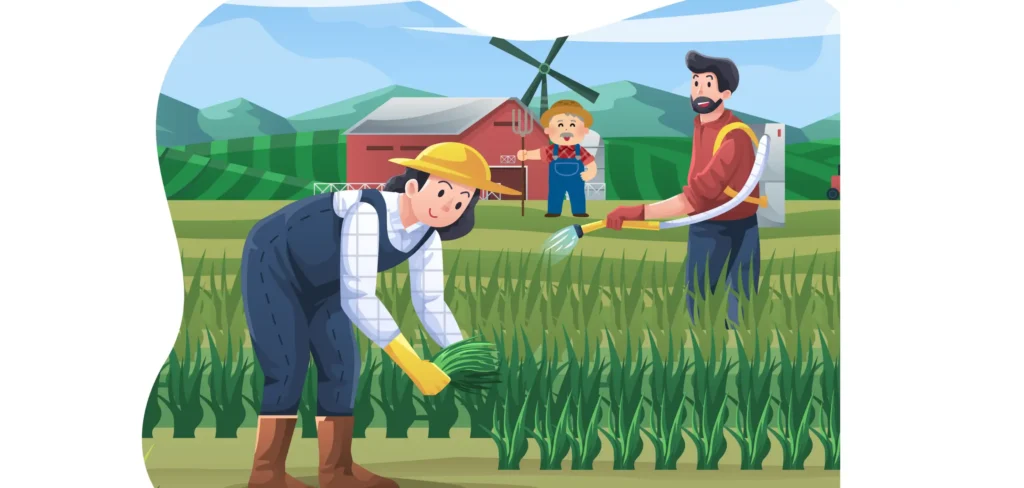Understanding government schemes can be tough, especially when they’re explained in complicated terms. That’s why we’ve simplified the details of major agriculture assistance schemes for you.
Whether you’re a farmer, a student, or simply curious, this guide will give you a clear picture of each scheme and how it benefits farmers. You can read the article to explore full details if you want to learn more!

Latest agriculture schemes for farmers in India 2024
Table of Contents
1. Pradhan Mantri Fasal Bima Yojana (PMFBY)
What is it?
Pradhan Mantri Fasal Bima Yojana is a Crop insurance schemes designed by the Government of India to protect farmers against financial losses due to natural calamities, pests and diseases. This scheme ensures that farmers do not face hardships due to events beyond their control.
Why It’s Useful:
- Farmers pay only a small part of the insurance premium:
- 2% for Kharif crops
- 1.5% for Rabi crops
- 5% for commercial and horticulture crops
- The remaining premium is paid by the government.
- Covers crop losses due to droughts, floods, pests, and more.
How It Helps Farmers: This scheme gives farmers peace of mind, knowing they’ll receive financial support if their crops fail due to reasons like bad weather.
Also Read: Learn Everything About PMFBY Here
2. Pradhan Mantri Krishi Sinchayee Yojana (PMKSY)
What is it?
The aim of Pradhan Mantri Krishi Sinchai Yojana is to provide water to every farm and ensure efficient use of water resources, basically its an agriculture irrigation schemes It supports projects like building canals, small dams and irrigation systems that help farmers to use water properly in their farming.
Why It’s Useful:
- Offers subsidies for setting up micro-irrigation systems like drip and sprinkler irrigation.
- Encourages water-saving techniques and reduces water wastage.
- Promotes better irrigation in areas with water scarcity.
How It Helps Farmers: Farmers can grow more crops and improve productivity, even in regions with limited water resources.
Read: Explore Full Details About PMKSY Here
3. PM-Kisan Samman Nidhi Yojana
What is it?
PM-Kisan Samman Nidhi Yojana is a direct agriculture assistance scheme for small and marginal farmers. Through this scheme, farmers are provided ₹6000 per year so that they can fulfill their agricultural needs. This amount is directly transferred to their bank accounts, which ensures transparency and the middlemen are less and there is no room for corruption. This is why Pm kishan samman nidhi yojana is one of the most popular agriculture assistance schemes.
Why It’s Useful:
- Farmers receive the amount in three installments of ₹2,000 each.
- The funds can be used for buying seeds, fertilizers, or other essentials.
- It helps ease the financial burden during planting seasons.
How It Helps Farmers: This scheme ensures that farmers have a steady income to support their families and prepare for the next crop cycle.
You can also read: Find Out More About PM-Kisan Here
4. Rashtriya Krishi Vikas Yojana (RKVY)
What is it?
The Rashtriya Krishi Vikas Yojana is a government agriculture assistance that allows states to plan and implement agricultural projects based on their specific needs. The aim of this scheme is to increase productivity through new innovations and infrastructure development to help the farmers of their state.
Why It’s Useful:
- Provides funds for activities like organic farming, agricultural research, and building warehouses.
- Encourages states to adopt modern techniques and improve farming practices.
- Supports projects that address regional challenges in agriculture.
How It Helps Farmers: Farmers benefit from better tools, techniques, and infrastructure, leading to higher productivity and income.
Also Read: Detailed Information About RKVY Here
5. Soil Health Card Scheme
What is it?
The Soil Health Card Scheme helps farmers to understand their soil in a better way by providing detailed report about the nutrients and health of the soil. Referring to this report, farmers are helped to use the right fertilizers and improve the crop yield and this also increases the crop yield a lot for the farmers.
Why It’s Useful:
- Farmers get a customized report on their soil’s nutrient levels.
- Recommendations are provided on the type and quantity of fertilizers to use.
- Reduces unnecessary fertilizer usage, saving costs.
How It Helps Farmers: By using fertilizers and techniques suited to their soil type, farmers can improve their yield while maintaining soil health for the future.
Read More: What is the Soil Health Card Scheme, and how does it benefit farmers?
6. Kisan Credit Card (KCC)
What is it?
The Kisan Credit Card provides easy and affordable credit facility to farmers for their agricultural needs. This seed covers the expenses like fertilizer irrigation and even the expenses incurred after the crop and farmers can use it like a normal credit card and can buy the farming goods they need as soon as possible.
Why It’s Useful:
- Farmers can get short-term loans at low interest rates.
- Includes coverage for crop failure due to natural calamities.
- Offers accidental insurance for the cardholder.
How It Helps Farmers: The KCC ensures that farmers have access to funds whenever they need them, reducing their dependence on moneylenders.
Learn How to Apply for KCC Here
7. Gobardhan Yojana
What is it?
Gobardhan Yojana (Galvanizing Organic Bio-Agro Resources Dhan) is a government initiative agriculture assistance scheme to manage cattle dung and organic waste in rural areas by converting them into biogas and bio-fertilizers. This scheme promotes sustainable energy, environmental cleanliness, and additional income for farmers.
Why It’s Useful:
- Encourages waste-to-wealth solutions for rural communities.
- Provides subsidies for setting up biogas plants.
- Reduces dependency on chemical fertilizers and LPG.
- Improves soil health with organic fertilizers.
How It Helps Farmers:
Gobardhan Yojana empowers farmers by providing financial support, clean energy, and a sustainable waste management system.
What is the Gobardhan Scheme? Read Here
8. Pashu Bima Yojana (Bihar)
Insurance for Livestock Owners in Bihar
Livestock is an important asset for many farmers of Bihar and Pashu Bima Yojana is designed to protect them from the loss caused by the death of animals, especially. This scheme also cover cattle, buffalo and other livestock and provides compensation to the farmers.
- Coverage: 50% to 70% of the market value of the livestock in case of death.
- Premium: Highly subsidized by the government, making it affordable for farmers.
By securing their livestock, farmers can focus on sustaining their livelihoods without worrying about unexpected financial setbacks.
Know More About Pashu Bima Yojana ➡️
Official Sources
For more official information on government schemes, visit the Ministry of Agriculture’s website.
Frequently Asked Questions (FAQs)
How will I know the last date to apply for a scheme?
To find the last date for applying, we recommend checking the official website for each scheme. We provide official website addresses in our blog articles, so you can get the most up-to-date and accurate information.
What does your website do?
We simplify government schemes and provide all the important details in easy language. Our goal is to make it easier for you to understand these schemes and how they can benefit you. Everything you need to know is available in one place!
How frequently does the government launch new schemes?
The government launches new schemes regularly, especially with each new budget and government policies. Some schemes may be launched yearly, while others may be seasonal or based on specific needs. Keep an eye on the updates we share on our website to stay informed.
Are any of these schemes chargeable?
Normally, there are no charges to apply for government schemes. However, it’s always a good idea to check the official notification for each scheme. If there are any fees, the official website will provide the correct details when you apply.
Can I apply for more than one scheme at the same time?
Yes, you can apply for multiple schemes, as long as you meet the eligibility requirements for each one. Just be sure to read the rules of each scheme to avoid any issues during the application process.
How do I check if I’m eligible for a scheme?
Eligibility criteria for each scheme are clearly mentioned on the official website, which we mention in our blog. It’s important to carefully read the requirements to make sure you qualify before applying.
Can I apply for a scheme online?
Most government schemes allow online applications. We include step-by-step guidance on how to apply through the official websites for each scheme. Just follow the instructions provided to submit your application easily.
What should I do if I face problems while applying for a scheme?
If you encounter any issues, check the official website for support and contact details. Many schemes have help centers where you can get assistance. If needed, you can also reach out to us, and we will guide you through the process.
Can I get financial assistance without a bank account?
For many schemes, a bank account is required for direct transfers. If you don’t have one, we encourage you to open a bank account. We also provide information on how to link your account to the schemes when necessary.
What happens if I miss the application deadline?
If you miss the application deadline, you may have to wait until the next round of applications or the next year when the scheme is relaunched. Always try to apply before the last date and keep checking the official website for any changes.
What are the main agriculture assistance schemes available for farmers in India?
Some key schemes include PM-KISAN, Pradhan Mantri Fasal Bima Yojana, and Soil Health Management Scheme, which provide financial support, insurance, and soil health improvement for farmers.
How can I apply for agricultural assistance schemes?
Applications for most agricultural assistance schemes can be made online through government portals or by visiting the nearest Common Service Center (CSC) for assistance with form submission.
Conclusion: Agriculture Assistance Schemes
These agriculture assistance schemes in India make farming easier by addressing financial challenges, helping farmers grow more crops, and reducing risks like crop failure. By understanding these government programs for farmers, individuals can take advantage of the support available to improve their livelihoods and farming practices. Our Government support for farmers is increaseing day by day.
Explore the guides above to learn how each scheme can benefit you or your farming community, and visit our Epfo Services homepage for more helpful resources!
Looking for more details?
Visit our Scheme Saathi Home Page to explore more about government schemes and how they can benefit you. Stay informed and empowered!


